
Exploration of the Pacific
Since 1718, transportation to the American colonies had been a penalty for various offences in Britain, with approximately one thousand convicts transported per year across the Atlantic. Forced to find an alternative location after the loss of the Thirteen Colonies in 1783, the British government turned to the newly discovered lands of Australia. The coast of Australia had been discovered for Europeans in 1606. The Australian colonies became profitable exporters of wool and gold,
War with Napoleonic France
Britain was challenged again by France under Napoleon, in a struggle that, unlike previous wars, represented a contest of ideologies between the two nations. It was not only Britain’s position on the world stage that was at risk: Napoleon threatened to invade Britain itself, just as his armies had overrun many countries of continental Europe.
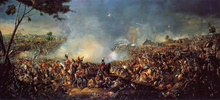
The Napoleonic Wars were therefore ones in which Britain invested large amounts of capital and resources to win. French ports were blockaded by the Royal Navy, which won a decisive victory over a Franco-Spanish fleet at Trafalgar in 1805. Overseas colonies were attacked and occupied, including those of the Netherlands, which was annexed by Napoleon in 1810. France was finally defeated by a coalition of European armies in 1815. Britain was again the beneficiary of peace treaties
Abolition of Slavery
With the advent of the Industrial Revolution, goods produced by slavery became less important to the British economy. Added to this was the cost of suppressing regular slave rebellions. With support from the British abolitionist movement, Parliament enacted the Slave Trade Act in 1807, which abolished the slave trade in the empire. In 1808, Sierra Leone Colony was designated an official British colony for freed slaves.
Britain’s Imperial Century (1815–1914)
Between 1815 and 1914, a period referred to as Britain’s “imperial century” around 26 million square kilometres of territory and roughly 400 million people were added to the British Empire. Victory over Napoleon left Britain without any serious international rival, other than Russia in Central Asia. Unchallenged at sea, Britain adopted the role of global policeman, a state of affairs later known as the Pax Britannica. Alongside the formal control it exerted over its own colonies, Britain’s dominant position in world trade meant that it effectively controlled the economies of many countries, such as China, Argentina and Siam, which has been described by some historians as an “Informal Empire”.
British imperial strength was underpinned by the steamship and the telegraph, new technologies invented in the second half of the 19th century, allowing it to control and defend the empire. By 1902, the British Empire was linked together by a network of telegraph cables.
East India Company rule and the British Raj in India
The East India Company drove the expansion of the British Empire in Asia. The Company’s army had first joined forces with the Royal Navy during the Seven Years’ War, and the two continued to co-operate in arenas outside India: the eviction of the French from Egypt (1799), the capture of Java from the Netherlands (1811), the acquisition of Penang Island (1786), Singapore (1819) and Malacca (1824), and the defeat of Burma (1826).
From its base in India, the Company had also been engaged in an increasingly profitable opium export trade to China since the 1730s. This trade, illegal since it was outlawed by the Qing dynasty in 1729, helped reverse the trade imbalances resulting from the British imports of tea, which saw large outflows of silver from Britain to China. In 1839, the confiscation by the Chinese authorities at Canton of 20,000 chests of opium led Britain to attack China in the First Opium War, and resulted in the seizure by Britain of Hong Kong Island, at that time a minor settlement.
During the late 18th and early 19th centuries the British Crown began to assume an increasingly large role in the affairs of the Company. The Company’s eventual end was precipitated by the Indian Rebellion in 1857, a conflict that had begun with the mutiny of sepoys, Indian troops under British officers and discipline. The rebellion took six months to suppress, with heavy loss of life on both sides. The following year the British government dissolved the Company and assumed direct control over India 1858 establishing the British Raj, India became the empire’s most valuable possession, “the Jewel in the Crown”, and was the most important source of Britain’s strength. A series of serious crop failures in the late 19th century led to widespread famines on the subcontinent in which it is estimated that over 15 million people died. The East India Company had failed to implement any coordinated policy to deal with the famines during its period of rule. Later, under direct British rule, commissions were set up after each famine to investigate the causes and implement new policies, which took until the early 1900s to have an effect.
Rivalry with Russia
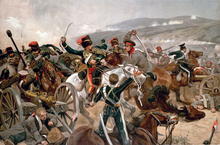
During the 19th century, Britain and the Russian Empire vied to fill the power vacuums that had been left by the declining Ottoman Empire, Qajar dynasty and Qing Dynasty. This rivalry in Central Asia came to be known as the “Great Game”. As far as Britain was concerned, defeats inflicted by Russia on Persia and Turkey demonstrated its imperial ambitions and capabilities and stoked fears in Britain of an overland invasion of India. In 1839, Britain moved to pre-empt this by invading Afghanistan, but the First Anglo-Afghan War was a disaster for Britain.
When Russia invaded the Turkish Balkans in 1853, fears of Russian dominance in the Mediterranean and Middle East led Britain and France to invade the Crimean Peninsula to destroy Russian naval capabilities The ensuing Crimean War (1854–56), which involved new techniques of modern warfare, was the only global war fought between Britain and another imperial power during the Pax Britannica and was a resounding defeat for Russia. The situation remained unresolved in Central Asia for two more decades, with Britain annexing Baluchistan in 1876 and Russia annexing Kirghizia, Kazakhstan, and Turkmenistan. For a while it appeared that another war would be inevitable, but the two countries reached an agreement on their respective spheres of influence in the region in 1878 and on all outstanding matters in 1907 with the signing of the Anglo-Russian Entente. The destruction of the Russian Navy by the Japanese at the Battle of Port Arthur during the Russo-Japanese War of 1904–05 also limited its threat to the British.
Cape to Cairo
The Dutch East India Company had founded the Cape Colony on the southern tip of Africa in 1652 as a way station for its ships travelling to and from its colonies in the East Indies. Britain formally acquired the colony, and its large Afrikaner (or Boer) population in 1806, having occupied it in 1795 to prevent its falling into French hands. British immigration began to rise after 1820, and pushed thousands of Boers, resentful of British rule, northwards to found their own—mostly short-lived—independent republics, during the Great Trek of the late 1830s and early 1840s. In the process the Voortrekkers clashed repeatedly with the British, who had their own agenda with regard to colonial expansion in South Africa. Eventually the Boers established two republics which had a longer lifespan: the South African Republic or Transvaal Republic (1852–77; 1881–1902) and the Orange Free State (1854–1902). In 1902 Britain occupied both republics, concluding a treaty with the two Boer Republics following the Second Boer War (1899–1902)
In 1869 the Suez Canal opened under Napoleon III, linking the Mediterranean with the Indian Ocean. Initially the Canal was opposed by the British; but once opened; its strategic value was quickly recognised and became the “jugular vein of the Empire”.] In 1875, the Conservative government of Benjamin Disraeli bought the indebted Egyptian ruler Isma’il Pasha’s 44% shareholding in the Suez Canal for £4 million (equivalent to £370 million in 2018). Although this did not grant outright control of the strategic waterway, it did give Britain leverage. Joint Anglo-French financial control over Egypt ended in outright British occupation in 1882.
With competitive French, Belgian and Portuguese activity in the lower Congo River region undermining orderly colonisation of tropical Africa, the Berlin Conference of 1884–85 was held to regulate the competition between the European powers in what was called the “Scramble for Africa” by defining “effective occupation” as the criterion for international recognition of territorial claims The scramble continued into the 1890s, and caused Britain to reconsider its decision in 1885 to withdraw from Sudan. A joint force of British and Egyptian troops defeated the Mahdist Army in 1896, and rebuffed an attempted French invasion at Fashoda in 1898. Sudan was nominally made an Anglo-Egyptian condominium, but a British colony in reality.
British gains in Southern and East Africa prompted Cecil Rhodes, pioneer of British expansion in Southern Africa, to urge a “Cape to Cairo” railway linking the strategically important Suez Canal to the mineral-rich south of the continent. During the 1880s and 1890s, Rhodes, with his privately owned British South Africa Company, occupied and annexed territories subsequently named after him, Rhodesia.
World Wars (1914–1945)
By the turn of the 20th century, fears had begun to grow in Britain that it would no longer be able to defend the empire. Germany was rapidly rising as a military and industrial power and was now seen as the most likely opponent in any future war. Recognising that it was overstretched in the Pacific[ and threatened at home by the Imperial German Navy, Britain formed an alliance with Japan in 1902 and with its old enemies France and Russia in 1904 and 1907, respectively.
First World War
Britain’s fears of war with Germany were realised in 1914 with the outbreak of the First World War. Britain quickly invaded and occupied most of Germany’s overseas colonies in Africa. Plans for a post-war division of the Ottoman Empire, which had joined the war on Germany’s side, were secretly drawn up by Britain and France under the 1916 Sykes–Picot Agreement. This agreement was not divulged to the Sharif of Mecca, who the British had been encouraging to launch an Arab revolt against their Ottoman rulers, giving the impression that Britain was supporting the creation of an independent Arab state. Under the terms of the concluding Treaty of Versailles signed in 1919, the empire reached its greatest extent with the addition of 4.7 m square kilometres and 13 million new subjects. The colonies of Germany and the Ottoman Empire were distributed to the Allied powers. Britain gained control of Palestine, Transjordan, Iraq.
Inter-war period
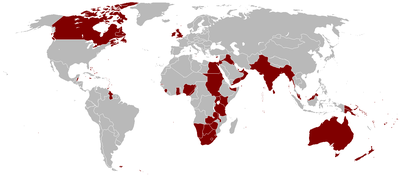
The changing world order that the war had brought about, in particular the growth of the United States and Japan as naval powers, and the rise of independence movements in India and Ireland, caused a major reassessment of British imperial policy. Forced to choose between alignment with the United States or Japan, Britain opted not to renew its Japanese alliance and instead signed the 1922 Washington Naval Treaty, where Britain accepted naval parity with the United States
In 1922, Egypt, which had been declared a British protectorate at the outbreak of the First World War, was granted formal independence, though it continued to be a British client state until 1954. British troops remained stationed in Egypt until the signing of the Anglo-Egyptian Treaty in 1936, under which it was agreed that the troops would withdraw but continue to occupy and defend the Suez Canal zone.
In Palestine, Britain was presented with the problem of mediating between the Arabs and increasing numbers of Jews. The 1917 Balfour Declaration, which had been incorporated into the terms of the mandate, stated that a national home for the Jewish people would be established in Palestine, and Jewish immigration allowed up to a limit that would be determined by the mandatory power. This led to increasing conflict with the Arab population, who openly revolted in 1936. As the threat of war with Germany increased during the 1930s, Britain judged the support of Arabs as more important than the establishment of a Jewish homeland, and shifted to a pro-Arab stance, limiting Jewish immigration and in turn triggering a Jewish insurgency.
Second World War
Britain’s declaration of war against Nazi Germany in September 1939, after the fall of France in June 1940, Britain and the empire stood alone against Germany, In August 1941, Churchill and Roosevelt met and signed the Atlantic Charter, which included the statement that “the rights of all peoples to choose the form of government under which they live” should be respected. This wording was ambiguous as to whether it referred to European countries invaded by Germany and Italy, or the peoples colonised by European nations, and would later be interpreted differently by the British, Americans, and nationalist movements.
In December 1941, Japan launched, in quick succession, attacks on British Malaya, the United States naval base at Pearl Harbor, and Hong Kong. Churchill’s reaction to the entry of the United States into the war was that Britain was now assured of victory and the future of the empire was safe, but the manner in which British forces were rapidly defeated in the Far East irreversibly harmed Britain’s standing and prestige as an imperial power. Most damaging of all was the Fall of Singapore, which had previously been hailed as an impregnable fortress and the eastern equivalent of Gibraltar.
Decolonisation and Decline (1945–1997)
Though Britain and the empire emerged victorious from the Second World War, the effects of the conflict were profound, both at home and abroad. Much of Europe, a continent that had dominated the world for several centuries, was in ruins, and host to the armies of the United States and the Soviet Union, who now held the balance of global power. Britain was left essentially bankrupt, with insolvency only averted in 1946 after the negotiation of a $US 4.33 billion loan from the United States, the last instalment of which was repaid in 2006., however, American anti-communism prevailed over anti-imperialism, and therefore the United States supported the continued existence of the British Empire to keep Communist expansion in check. The “wind of change” ultimately meant that the British Empire’s days were numbered, and on the whole, Britain adopted a policy of peaceful disengagement from its colonies once stable, non-Communist governments were established to assume power. This was in contrast to other European powers such as France and Portugal, which waged costly and ultimately unsuccessful wars to keep their empires intact. Between 1945 and 1965, the number of people under British rule outside the UK itself fell from 700 million to five million, three million of whom were in Hong Kong.
Initial disengagement
The pro-decolonisation Labour government, elected at the 1945 general election and led by Clement Attlee, moved quickly to tackle the most pressing issue facing the empire: Indian independence. Lord Mountbatten, hastily brought forward the date to 15 August 1947. The borders drawn by the British to broadly partition India into Hindu and Muslim areas left tens of millions as minorities in the newly independent states of India and Pakistan. Millions of Muslims subsequently crossed from India to Pakistan and Hindus vice versa, and violence between the two communities cost hundreds of thousands of lives. Burma, which had been administered as part of the British Raj, and Sri Lanka gained their independence the following year in 1948. India, Pakistan and Sri Lanka became members of the Commonwealth, while Burma chose not to join
The British mandate in Palestine, where an Arab majority lived alongside a Jewish minority, presented the British with a similar problem to that of India. The matter was complicated by large numbers of Jewish refugees seeking to be admitted to Palestine following the Holocaust, while Arabs were opposed to the creation of a Jewish state. Frustrated by the intractability of the problem, attacks by Jewish paramilitary organisations and the increasing cost of maintaining its military presence, Britain announced in 1947 that it would withdraw in 1948 and leave the matter to the United Nations to solve. The UN General Assembly subsequently voted for a plan to partition Palestine into a Jewish and an Arab state. It was immediately followed by the outbreak of a civil war between the Arabs and Jews of Palestine, and British forces withdrew amid the fighting. The British Mandate for Palestine officially terminated at midnight on 15 May 1948 as the State of Israel declared independence and the 1948 Arab-Israeli War broke out, during which the territory of the former Mandate was partitioned between Israel and the surrounding Arab states. Amid the fighting, British forces continued to withdraw from Israel, with the last departing on 30 June 1948.
Following the surrender of Japan in the Second World War, anti-Japanese resistance movements in Malaya turned their attention towards the British, who had moved to quickly retake control of the colony, valuing it as a source of rubber and tin. The Malayan Emergency, as it was called, began in 1948 and lasted until 1960, but by 1957, Britain felt confident enough to grant independence to the Federation of Malaya within the Commonwealth. In 1963, the 11 states of the federation together with Singapore, Sarawak and North Borneo joined to form Malaysia, but in 1965 Chinese-majority Singapore was expelled from the union following tensions between the Malay and Chinese populations and became an independent city-state.. Brunei, which had been a British protectorate since 1888, declined to join the union and maintained its status until independence in 1984.
Suez and its aftermath
In 1951, Winston Churchill and the Conservatives believed that Britain’s position as a world power relied on the continued existence of the empire, with the base at the Suez Canal allowing Britain to maintain its pre-eminent position in the Middle East in spite of the loss of India. However, Churchill could not ignore Gamal Abdul Nasser’s new revolutionary government of Egypt that had taken power in 1952, and the following year it was agreed that British troops would withdraw from the Suez Canal zone and that Sudan would be granted self-determination by 1955, with independence to follow. Sudan was granted independence on 1 January 1956.
In July 1956, Nasser unilaterally nationalised the Suez Canal. The response of Anthony Eden, who had succeeded Churchill as Prime Minister, was to collude with France to engineer an Israeli attack on Egypt that would give Britain and France an excuse to intervene militarily and retake the canal. Eden infuriated US President Dwight D. Eisenhower by his lack of consultation, and Eisenhower refused to back the invasion. Another of Eisenhower’s concerns was the possibility of a wider war with the Soviet Union after it threatened to intervene on the Egyptian side. Eisenhower applied financial leverage by threatening to sell US reserves of the British pound and thereby precipitate a collapse of the British currency. Though the invasion force was militarily successful in its objectives, UN intervention and US pressure forced Britain into a humiliating withdrawal of its forces, and Eden resigned.
The Suez Crisis very publicly exposed Britain’s limitations to the world and confirmed Britain’s decline on the world stage and its end as a superpower, demonstrating that henceforth it could no longer act without at least the acquiescence, if not the full support, of the United States. While the Suez Crisis caused British power in the Middle East to weaken, it did not collapse. Britain again deployed its armed forces to the region, intervening in Oman (1957), Jordan (1958) and Kuwait (1961), though on these occasions with American approval, as the new Prime Minister Harold Macmillan’s foreign policy was to remain firmly aligned with the United States. Although Britain granted Kuwait independence in 1961, it continued to maintain a military presence in the Middle East for another decade. On 16 January 1968, a few weeks after the devaluation of the pound, Prime Minister Harold Wilson and his Defence Secretary Denis Healey announced that British troops would be withdrawn from major military bases East of Suez, which included the ones in the Middle East, and primarily from Malaysia and Singapore by the end of 1971, instead of 1975 as earlier planned.[ By that time over 50,000 British military personnel were still stationed in the Far East, including 30,000 in Singapore. The British granted independence to the Maldives in 1965 but continued to station a garrison there, withdrew from Aden in 1967, granted independence to Bahrain, Qatar, and the United Arab Emirates in 1971, and withdrew the forces stationed in the Maldives in 1976.
Wind of Change
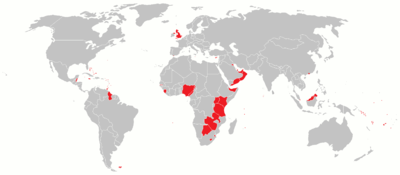
Macmillan gave a speech in Cape Town, South Africa in February 1960 where he spoke of “the wind of change blowing through this continent”. Macmillan wished to avoid the same kind of colonial war that France was fighting in Algeria, and under his premiership decolonisation proceeded rapidly. To the three colonies that had been granted independence in the 1950s—Sudan, the Gold Coast and Malaya—were added nearly ten times that number during the 1960s.
Britain’s remaining colonies in Africa, except for self-governing Southern Rhodesia, were all granted independence by 1968. British withdrawal from the southern and eastern parts of Africa was not a peaceful process. Kenyan independence was preceded by the eight-year Mau Mau uprising, in which tens of thousands of suspected rebels were interred by the colonial government in detention camps. In Rhodesia, the 1965 Unilateral Declaration of Independence by the white minority resulted in a civil war that lasted until the Lancaster House Agreement of 1979, which set the terms for recognised independence in 1980, as the new nation of Zimbabwe
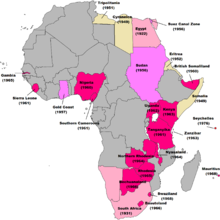
In the Mediterranean, a guerrilla war waged by Greek Cypriots ended in 1960 leading to an independent Cyprus, with the UK retaining the military bases of Akrotiri and Dhekelia. The Mediterranean islands of Malta and Gozo were amicably granted independence from the UK in 1964 and became the country of Malta. Most of the UK’s Caribbean territories achieved independence after the departure in 1961 and 1962 of Jamaica and Trinidad from the West Indies Federation, British territories in the Pacific acquired independence in the 1970s beginning with Fiji in 1970 and ending with Vanuatu in 1980.
End of Empire
In 1980, Southern Rhodesia, Britain’s last African colony, became the independent nation of Zimbabwe. Aside from a scattering of islands and outposts, the process of decolonisation that had begun after the Second World War was largely complete. In 1984, Brunei, Britain’s last remaining Asian protectorate, gained its independence.
In September 1982 the Prime Minister, Margaret Thatcher, travelled to Beijing to negotiate with the Chinese government, on the future of Britain’s last major and most populous overseas territory, Hong Kong. Under the terms of the 1842 Treaty of Nanking and 1860 Convention of Peking, Hong Kong Island and Kowloon Peninsula had been respectively ceded to Britain in perpetuity, but the vast majority of the colony was constituted by the New Territories, which had been acquired under a 99-year lease in 1898, due to expire in 1997. Thatcher, seeing parallels with the Falkland Islands, initially wished to hold Hong Kong and proposed British administration with Chinese sovereignty, though this was rejected by China. A deal was reached in 1984—under the terms of the Sino-British Joint Declaration, Hong Kong would become a special administrative region of the People’s Republic of China, maintaining its way of life for at least 50 years. The handover ceremony in 1997 marked for many “the end of Empire”
Legacy
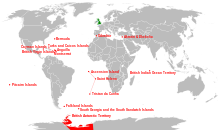
Most former British colonies and protectorates are among the 52 member states of the Commonwealth of Nations, comprising a population of around 2.2 billion people. Sixteen Commonwealth realms voluntarily continue to share the British monarch, Queen Elizabeth II, as their head of state. These sixteen nations are distinct and equal legal entities – the United Kingdom, Australia, Canada, New Zealand, Antigua and Barbuda, The Bahamas, Barbados, Belize, Grenada, Jamaica, Papua New Guinea, Saint Kitts and Nevis, Saint Lucia, Saint Vincent and the Grenadines, Solomon Islands and Tuvalu.
Decades, and in some cases centuries, of British rule and emigration have left their mark on the independent nations that arose from the British Empire. The empire established the use of English in regions around the world. Today it is the primary language of up to 460 million people and is spoken by about one and a half billion as a first, second or foreign language.
The spread of English from the latter half of the 20th century has been helped in part by the cultural and economic influence of the United States, itself originally formed from British colonies. Except in Africa where nearly all the former colonies have adopted the presidential system, the English parliamentary system has served as the template for the governments for many former colonies, and English common law for legal systems.


